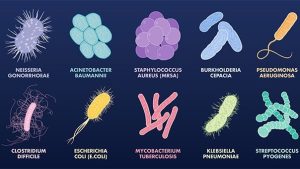Bacteria
Bacteria
- A highly variable group of microorganisms
- They can be found in almost all habitats
- Many cause diseases, others play an important role in the natural cycle of elements, thus contributing to soil fertility.
- Many can cause spoilage of food, others, on the contrary, are used in food production.
Viruses
- They can only reproduce inside living cells, i.e. they are parasites.
Bacteria are unicellular microorganisms that, under normal conditions, reproduce by binary fission, that is, by splitting the cell into two parts. Bacteria are mainly classified according to the appearance of their cells. Bacteria reproduce best when there is enough food and a favorable temperature.
Under ideal conditions, they split in half every ten to twenty minutes.

SPORING
Only a few genera of bacteria form spores: the most famous are Bacillus and Clostridium. Sporulation is a way of protecting cells from adverse environmental conditions, such as overheating, disinfectants, drought, or lack of nutrients. When favorable conditions occur, the spore again turns into a vegetative cell, starting reproduction. Spores are dormant cells that lack metabolic processes, so they cannot reproduce. They can survive in dry air for many years and are less sensitive to chemical sterilizers, antibiotics, desiccation and UV radiation. They are also resistant to heat: spores can be destroyed by boiling them at a temperature of 120 ° C for 20–30 minutes.


